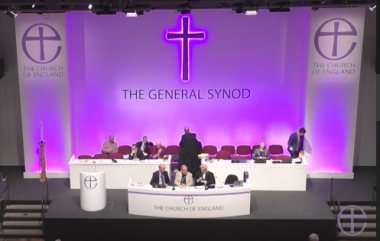The General Synod of the Church of England was so shocking. Here's why

I am still shocked by General Synod.
I thought a few days of quiet reflection before writing anything might make a difference.
After all, it's so easy to rush to be critical. And whatever else might be said about them, members of the Church of England's ruling body – the General Synod – give up a lot of time and energy in order to take part in it. They even meet in the middle of the Wimbledon tennis fortnight, which must surely count as some gently Anglican form of martyrdom.
But a few days have gone past now since the latest synod finished, and to be honest I still feel really quite shocked.
It's not that there aren't some good things to welcome, of course. It's great that the church wants to be explicit in its welcome of people who class themselves as transgender. After all, Jesus is for everyone. And it's also good to distance ourselves from anything in terms of counselling which is ethically dubious. Many in the Christian world have heard horrific stories about faith-shatteringly bad 'counselling'.
So why, then, do I feel rather bleak? The answer is simple: the apparent absence at synod of real theology – in other words, the ability to reflect on complex issues with calmness, depth and clarity from an explicitly Christian perspective.
For example, if we are going to ask bishops to consider producing a special liturgy to mark gender transition, isn't it a good idea to have a theological perspective on transgender issues first? It turns out there was indeed an amendment suggesting that such a study be carried out. Its proposer, Nicholas Land, declared: 'It is absolutely right we seek to help people with gender variance... But at present it is difficult to see how this can be achieved in the absence of clear theological opinion.' Bafflingly, however, this seemingly obvious first step was rejected.
And if we are going to oppose sexual 'conversion therapy', isn't it a good idea to have a definition of what specific methods of counselling are in mind – and some theological context? As Ed Shaw, himself a gay synod member, said: 'I voted against the motion to ban conversion therapy because there was no clear definition of what exactly we were banning. Plenty of appalling past practices were movingly shared and if the motion had been specific enough to give me a chance to clearly condemn such damaging behaviour I would have gladly taken it.' This too seems perplexing.
The absence of theological reflection is disturbing. The Rev Mark Lucas – a usually mild-mannered and irenic evangelical Synod member – was moved to thunder on his blog: 'The debating chamber has been, almost solely, a pink fluffy, theology-free, Bible-mocking, sin-affirming, solipsism of multitudinous, anthropocentric anecdote!'
And Stephen Lynas, Senior Chaplain to the Bishop of Bath and Wells, wrote: 'There was little theological reflection (apart from a few nods to Scripture, Tradition and Reason). While we were intensely pastoral, then, we were not as analytical as befits a major Synod with carefully-designed processes of scrutiny and decision-making.'
Part of the issue at least seems to have been the non-participation of most bishops in shaping the theological debate. Again as Stephen Lynas writes: 'There are more than 50 of them on synod, but we heard very little from them on either of these motions.' To which the natural response is, 'Why? Are bishops not our teachers, shepherds and guides?'
I don't think it is negative or nit-picky to want important decisions to be grounded in thoughtful theology. As I have written before, I am a third generation Anglican minister. The Church of England is in my blood. My default instinct is to want it to succeed. But this last Synod has left me asking myself all sorts of hard questions.
Perhaps the final irony is that one of the last items synod discussed was clergy stress. How appropriate indeed, given that for many of us ordinary church ministers, at least some of our pressure comes from trying to explain to our wondering parishioners what is going on during these debates.
Thomas Cranmer had it about right in his 1662 Prayer Book collect when he wrote: 'Almighty and everlasting God, who alone workest great marvels: Send down upon our Bishops ... the healthful Spirit of thy grace; and that they may truly please thee, pour upon them the continual dew of thy blessing. Grant this, O Lord, for the honour of our Advocate and Mediator, Jesus Christ. Amen.'
David Baker is a former daily newspaper journalist now working as an Anglican minister in Sussex, England. Find him on Twitter @Baker_David_A











